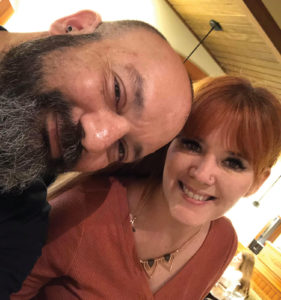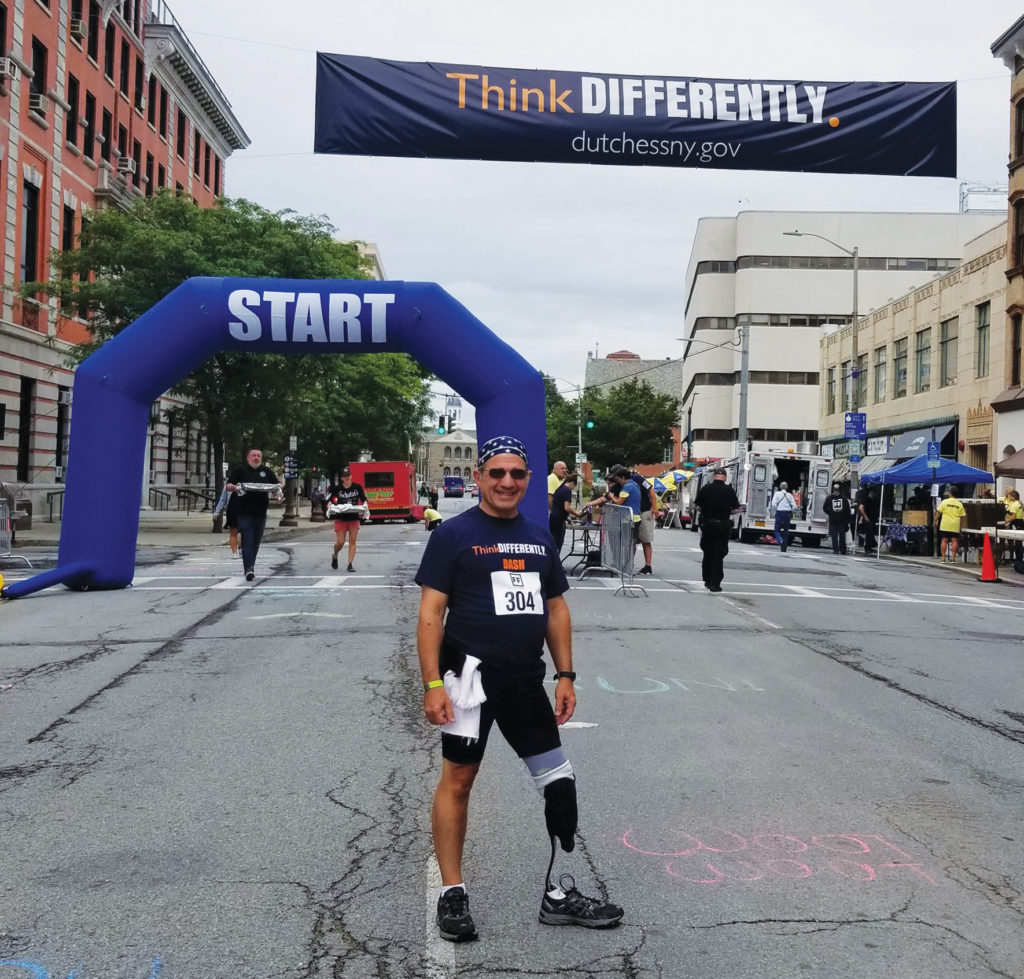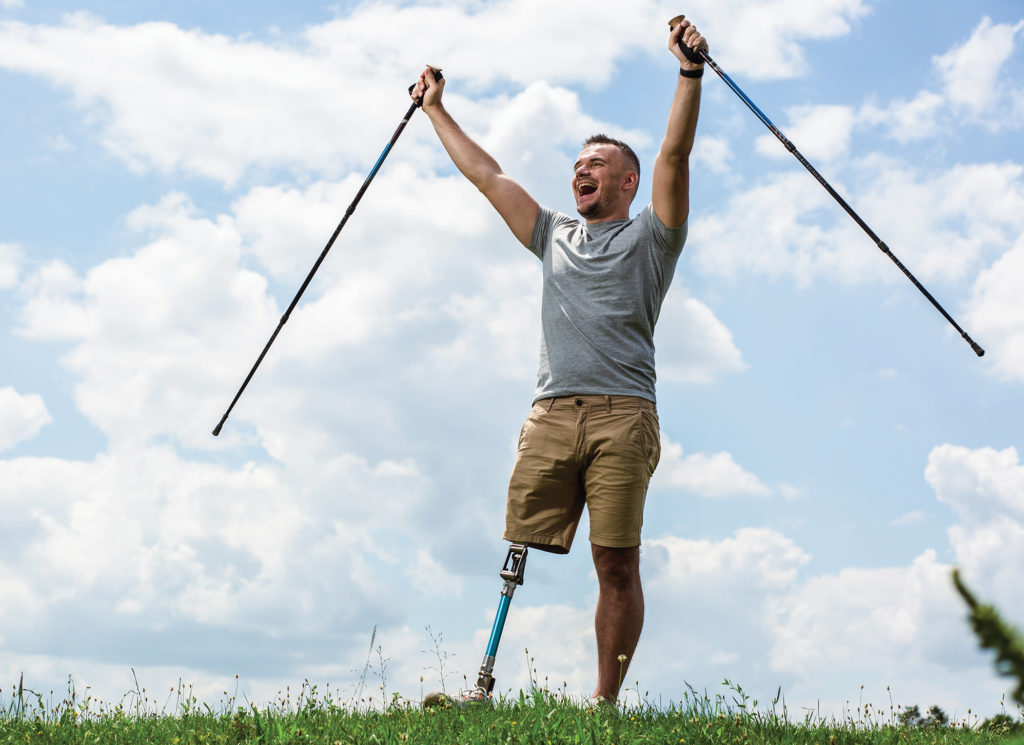By Rene Agredano
Every morning, Ricky Bartlett wakes up and turns on the television before doing anything else. But it’s not the flat-screen TV on his living room wall that gets his attention—it’s the imaginary one broadcasting in his mind.
“What do you want to watch today?” he asks while staring into the mirror. A drama begins playing in the dark corners of his consciousness, but he quickly changes the channel and imagines a happier day. Then he goes about living it.

Emotional upheaval is not uncommon in the lives of amputees like Bartlett, but the COVID-19 global health pandemic has put many people’s mental health under siege like never before. From feelings of loneliness and isolation brought on by physical distancing to constant worry about infection, it’s easy to feel hopeless and helpless. The struggle of limb loss, coupled with contagious health threats, is an ongoing assault on the mind that requires daily management to rise above it.
“This pandemic has forced changes on everyone,” says Albert Garcia, LMSW. The San Antonio-based amputee and social worker says he is feeling the impact too. “For the first time (to my knowledge), Americans have been faced with self-isolation to slow an unknown illness. This isn’t easy to do as we are social creatures,” he explains. Job loss, health issues, and worries over supply shortages can push anyone over the COVID-19 cliff. “Now you throw in recovery from a recent limb loss, along with the anxieties associated with it, and all of a sudden we see how delicate our individual worlds really are.”
Numerous studies show a proven connection between mental and physical health, and both require equal amounts of attention to overcome unexpected, stressful situations. A daily mental health check like Bartlett’s may seem overly simplistic, but he is doing exactly what scientists recommend to boost your immune system and protect against disease. A 2007 study showed that an optimistic attitude appears to buffer the immune system from the effects of psychological stressors. Those who choose to emphasize the positive attributes of life can strengthen their outlook for the future and all the possibilities within it.
Bartlett, who lost his leg to necrotizing fasciitis (flesh-eating disease), certainly understands the mind-body connection. Although he wasn’t always a believer in the power of positivity, his new career in the entertainment industry is all the proof he needs to know that it makes life better. Five years after limb loss, Bartlett is now a television actor and on-air personality at KMRY 93.1FM / 1450AM in Cedar Rapids, Iowa. His morning mirror check has restored a level of happiness that he thought was gone forever.
“I only think of good thoughts,” he explains. “I never focus on the ‘poor, pitiful me…I’m an amputee’ train of philosophy anymore. I wake up every morning and say to myself, ‘I choose to have a good day,’ over and over again.” Even during the virus pandemic, Bartlett reminds himself to make deliberate choices that keep him upbeat. “My actions dictate how my day will be,” he says. “Everything that has or will happen to me is under my control. I choose to be hopeful. I choose to be happy, even with what’s going on in the world today. My actions will dictate my health as well. I know to some this may sound like a bunch of muck, but for me…it works.”
The COVID-19 pandemic is an unprecedented threat to our mental, physical, and spiritual health, but as Bartlett’s story illustrates, the mindset we choose is one of the greatest defenses against illness. To come out the other side of any crisis healthy and happy, consider embracing these simple techniques.
STEP 1
STAY IN CONTACT WITH OTHERS

As humans, we thrive in a social environment, but the COVID-19 crisis requires physical distancing from others to protect against infection. Thankfully, technology can bridge the gap during one of the most critical times in human history. With just an internet connection, we can still emotionally connect with others. “It helps to share your journey with other people,” says John Vacca, a co-facilitator of Mid-Hudson Limb Loss Group in Kingston, New York. “Peer support is really, really important.”

Online support groups, such as the Amputee Help and Support Line (www.facebook.com/groups/AmputeeHelp) on Facebook, may be available 24/7. Other online and in-person support groups can be found through the Amputee Coalition’s National Directory of Support Groups1 and Amplitude’s support group directory (www.livingwithamplitude.com/support-groups). Although nothing can beat in-person support group meetings, online communities still provide a lifeline of emotional support that’s better than none at all. When overwhelming emotions leave you feeling adrift, these groups make it easy to connect with others who can relate and explain how to come out on the other side. If you’re not comfortable being online, some groups may match you to someone who can talk with you on the phone. Once you establish these social connections, you will have them available to you during tough times in the future.
“Calls, texts, and social media make support available even while self-isolating,” says Garcia. “As amputees, we often feel alone, but we aren’t. Reach out. Speak up. Be present. Talk about the joys and the pain. A solid support system is very important to our mental health.”
STEP 2
LEARN TO TOLERATE THE UNKNOWN
Life can feel incredibly uncertain after limb loss, and a crisis elevates those fears and worries. At times like this, it’s easy to get lost in anxious “What if?” thoughts about the future. The problem with doing so is that a search for answers often leads to more worry about things that are completely out of your control.

“We are living in a universe of the unknown,” says Jill Zimmerman, a rabbi-at-large and spiritual guidance instructor from Southern California. “As human beings who like to know, our identities are about knowing. Not only is the coronavirus unknown, there’s so much that we do not know. We don’t know if we’re going to be affected, if our family is, how long this is going to go on, etc. We simply do not know. When we are confronted with this world in which there is so much we do not know, then we need a spiritual strategy.”
Zimmerman says building a tolerance for the unknown is one of the best ways to get started with that strategy. As an example, she encourages people in crisis to “imagine that we all are in a vast sea of mystery—and imagine yourself as a boat (or a duck) floating and flowing with it.” She also recommends looking to other times in life when you did not know the outcome of a worrisome situation. “Review how you felt about it, and what got you through it. Draw strength from what you can control—your own thoughts, actions you can take.”
STEP 3
SET SMALL GOALS FOR YOURSELF
Successfully finding your way through an emotional crisis can start with conquering one small goal at a time. From learning to walk with a prosthesis to wheelchair racing, going beyond your comfort zone has a profound impact on your mental health. For example, a 2017 Canadian project2 found that people with disabilities who participate in adaptive sports enjoy increased self-esteem, self-efficacy, sense of belonging, and physical well-being. Vacca understands this better than many people. At the age of 48, he lost his leg to cancer, but it wasn’t until he turned 60 that he got involved with adaptive sports. Soon, he discovered the joys of pushing past mental and physical barriers.

“It is such an energy high to be around people who love being engaged and pushing past perceived limitations,” he explains. “That’s really what it’s all about. Perceived limitations mean not allowing your negative thoughts about what you can’t do get in the way of thinking about what you can do.”
The feelings of empowerment and confidence he’s gained through adaptive sports are just as accessible when coping with other challenges. Vacca’s best advice to anyone feeling powerless against a crisis is to tackle small goals each day. The sense of accomplishment gained from achieving them will inspire you to build up to larger ones. “Think of reachable goals that you can focus on that are obtainable,” he suggests. “Not things that you can’t do, but things that you know you can do. Put the focus on things that are reachable. Then you’ll feel good about accomplishing those goals, and you’ll feel like, eventually, you can get to those goals that you can’t do today.”

When it comes to emotional resilience, if you’ve experienced limb loss, you are already one step ahead of most able-bodied people. Amputation is one of the greatest teachers of patience, adjustment skills, flexibility, and resilience. Life after limb loss makes people better at dealing with tough situations and unexpected crises. Stressful times will always be part of the human experience, but amputees already have most of what it takes to get through them.
“We can’t let [the COVID-19 pandemic] overwhelm us with negativity,” says Vacca. “It’s only going to affect us worse if we allow that to happen. And it’s not good for our health.” Instead, the 65-year-old support group leader says we must dig deep physically and mentally to uncover our best strengths. “I’m a believer in focusing on the positives of what we can do and being thankful for it,” he says. “Because that’s what you’re going to fuel yourself on to stay positive and not let those dark clouds hang around too long. The only way we are going to be able to make sunshine is to find that light in ourselves.”
You Already Have What It Takes.

HOW PETS IMPROVE OUR EMOTIONS
Dogs and cats don’t speak our language, but they know how to help us through an emotional crisis. Pet lovers have always known that just one stroke of an animal’s velvet-soft ears can ease a worried mind, but now there’s science that proves it. Recent studies examining the human-animal bond show a strong correlation between caring for a pet and one’s mental health. For example, when a 2016 United Kingdom study3 examined how companion animals provide support to people with long-term mental health illness, researchers learned that over time, pet caregiving provided a sense of responsibility that enabled greater feelings of order, control, and continuity in their daily activities.
A pet’s unwavering loyalty also helped study participants stay connected to society, even during their darkest days. When “you just want to sink into a pit and just sort of retreat from the entire world, the cats force me to still be involved with the world,” commented one person.

In a 2018 study by the Human Animal Bond Research Institute (HABRI), research revealed that service dogs matched with military members suffering from post-traumatic stress disorder (PTSD) provided “clinically significant reductions in PTSD symptoms,” including lower rates of depression, higher quality of life, and higher social functioning.4
Perhaps one of the greatest benefits of being a pet parent during a crisis is that we both benefit. Research shows that when dogs and humans interact, each enjoys physical benefits in the form of oxytocin, a feel-good hormone that lowers stress and floods the body with a sense of trust, relaxation, and social connectedness.
REFERENCES
- Amputee Coalition’s National Directory of Support Groups (https://www.amputee-coalition.org/support-groups-peer-support/support-group-network/)
- https://www.ncbi.nlm.nih.gov/pmc/articles/PMC5264324/
- https://www.medicalnewstoday.com/articles/314668, https://bmcpsychiatry.biomedcentral.com/articles/10.1186/s12888-016-1111-3
- https://psycnet.apa.org/doiLanding?doi=10.1037%2Fccp0000267
TOP IMAGE: agsandrew/stock.adobe.com



